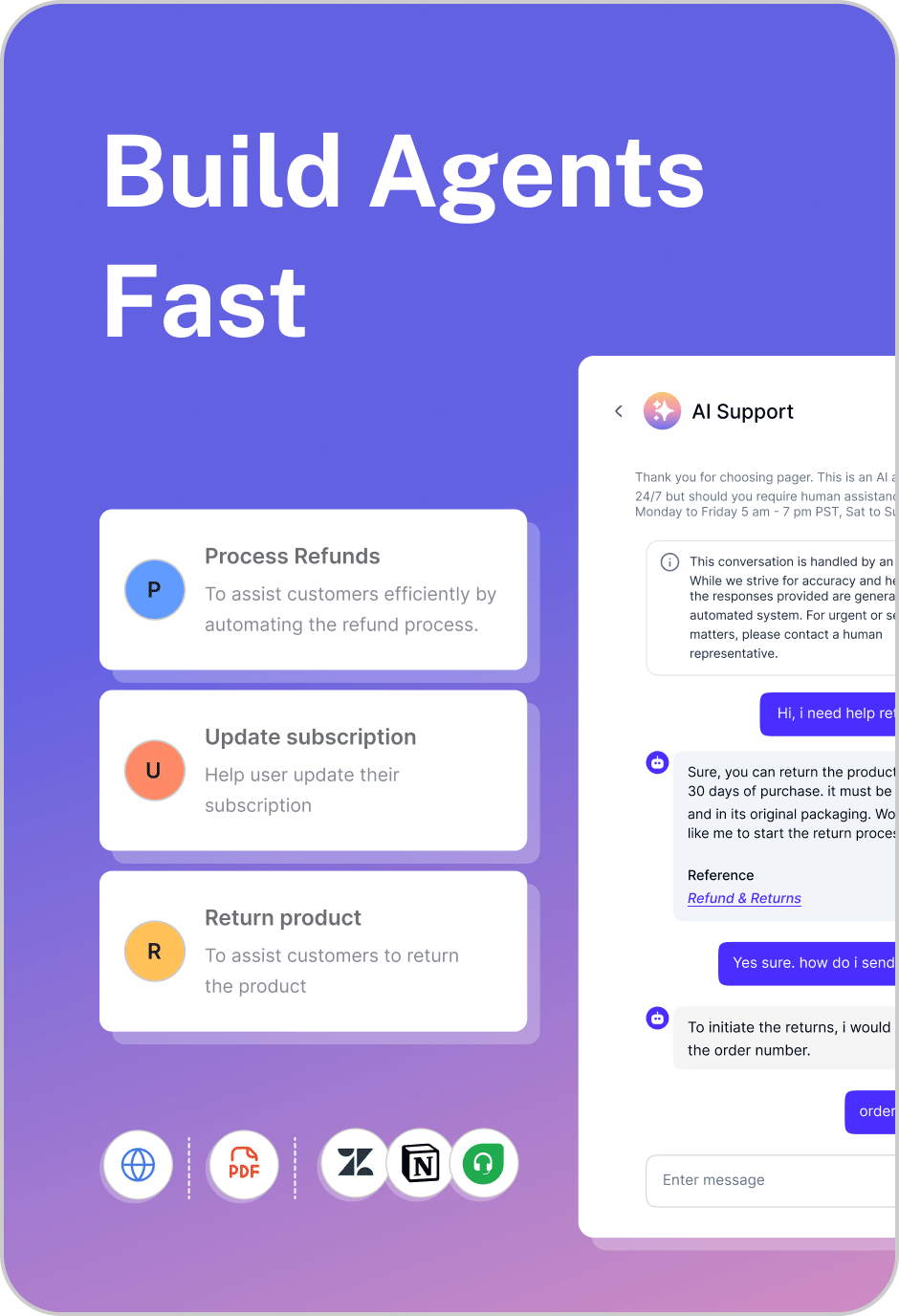
How AI Agents Are Revolutionizing the Technology Sector
Discover how AI agents enhance efficiency, reduce costs, and improve customer support in the tech industry. Explore real-time use cases and why pagergpt is a trusted solution.
The technology sector is at the forefront of innovation, yet even the most advanced companies face challenges in scaling customer support, streamlining internal operations, and maintaining 24/7 responsiveness. This is where AI agents are making a significant impact bridging the gap between human limitations and digital expectations.
In this article, we’ll explore the role of AI agents in the technology industry. From key use cases and operational benefits to real-world examples and the metrics that matter, we’ll break down why AI agents are no longer a futuristic concept but a present-day necessity.
Why the Technology Industry Needs AI Agents
AI agents aren’t just a trend—they’re a strategic asset for tech companies. Here’s why:
Scalability Without Headcount: AI agents allow tech businesses to scale operations without proportional increases in support staff.
Round-the-Clock Support: Global SaaS and platform companies operate in different time zones. AI ensures uninterrupted service.
Customer Expectations Are Evolving: Tech-savvy users expect intelligent, contextual responses in real-time.
Operational Complexity: With product updates, documentation, and APIs constantly evolving, AI agents can help maintain consistent communication.
Faster Resolutions: AI-powered agents reduce turnaround time by resolving common queries and routing only complex issues to humans.
Challenges in the Technology Industry Without AI Agents
Without automation, tech companies face several bottlenecks that limit growth and impact user experience:
Delayed Ticket Resolution: High ticket volumes often lead to long wait times.
Lack of Personalization: Human agents struggle to personalize responses at scale.
Manual Knowledge Access: Agents and users alike spend too much time digging through documentation.
Inconsistent Onboarding Support: New users often drop off due to unclear self-service.
High Operational Costs: Scaling support teams across time zones and languages is costly.
Key Use Cases and Real-Time Examples of AI Agents in the Technology Industry
AI agents are solving very specific problems in tech companies. Here’s how:
Technical Documentation Assistant
AI agents can instantly pull relevant articles or code snippets from your documentation portal when users ask technical queries.
Real-Time Example: A developer using a cloud platform asks, "How do I configure the webhook for alerts?"—the AI agent responds with the exact doc, saving minutes.
Developer Onboarding
AI guides new users through platform setup, sandbox creation, API key generation, etc., without needing human intervention.
Real-Time Example: A SaaS platform's new user receives step-by-step API onboarding instructions through chat.
Product Feature Discovery
Helps users uncover lesser-known product capabilities through contextual suggestions.
Real-Time Example: When a user types "Can I create recurring triggers?" the agent not only confirms but also provides usage examples.
Live Incident Communication
During system outages or updates, AI agents proactively inform customers and provide live updates.
Real-Time Example: A DevOps tool's agent updates users on deployment delays and advises on next steps.
Internal IT Helpdesk
Tech companies also use AI agents internally to resolve access issues, reset credentials, and triage tickets.
Real-Time Example: An employee resets their VPN access via the internal AI help agent in under 30 seconds.
Release Notes Summarization
Explains release notes and new features in plain English for end-users and team members alike.
Real-Time Example: A user types "What changed in version 2.3?" and gets a short AI-generated summary.
Lead Qualification for Demos
AI collects lead information, qualifies them based on criteria, and schedules demos with sales teams.
Real-Time Example: A visitor clicks on the chatbot, shares their intent, and gets booked for a sales call instantly.
Custom GPT Use Cases
Allows companies to build custom GPT models trained on internal tools and API documentation.
Real-Time Example: An AI agent trained on Jira and Confluence answers questions about internal processes.
How pagergpt’s AI Agent for Technology Helps You
pagergpt helps tech companies optimize their operations across customer support, internal helpdesks, and sales enablement. Key ways it drives ROI:
Reduces Resolution Time by 60–70%: Automates repetitive questions.
Cuts Support Costs by 40%: Reduces dependency on night shift or offshore agents.
Boosts CSAT by up to 35%: Always-on, consistent and helpful responses.
Accelerates Sales Funnel: Instantly qualifies and routes leads.
pagergpt’s Key Features That Help in Technology
No-Code AI Agent Studio: Build and deploy AI workflows without engineering.
Multi-Source Training: Pull knowledge from docs, websites, tools like Jira and Confluence.
Shared Inbox for Human Handoff: Ensure smooth transitions when human input is needed.
Live Widget + Omnichannel: Deploy AI on Slack, Teams, WhatsApp, and your app.
Analytics + Sentiment: Deep insights into performance, feedback, and escalations.
Conclusion
AI agents are no longer a luxury they are an operational backbone for modern tech companies. Whether it’s resolving tickets, onboarding users, or supporting engineers, AI unlocks scale, consistency, and performance.
With pagergpt, tech leaders can design, train, and deploy purpose-built AI agents for every team without writing a single line of code.
Book a demo to see how pagergpt can power your technology organization.
FAQs
1. How can AI agents help SaaS businesses?
AI agents can onboard users, resolve FAQs, and support developers, all with instant, 24/7 availability.
2. Can I integrate pagergpt with my internal tools?
Yes, pagergpt supports training on multiple sources like Jira, Confluence, GitHub, and more.
3. How secure is pagergpt for enterprise use?
pagergpt is SOC 2, ISO 27001, and GDPR compliant
4. Can I deploy the AI agent on Slack and Microsoft Teams?
Yes. pagergpt offers seamless omnichannel deployment including website, Slack, Teams, WhatsApp, and more.
5. What’s the difference between pagergpt and Chatbase?
See our Chatbase vs pagergpt comparison to understand feature and pricing differences.
6. How do I train an AI agent on my tech documentation?
Refer to our guide on how to train ChatGPT on your own data.
7. What’s a good AI agent example for tech support?
Explore real examples in our AI Customer Service Examples blog post.
Engage website visitors instantly,
resolve customer queries faster.
Do more than bots with pagergpt


